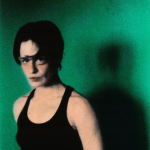
The Garnier Opera House stages a unique lyrical tragedy, “Médée” (Medea), by Marc-Antoine Charpentier (1643-1704), a work that took over a decade to premiere in Paris, boldly and precisely orchestrated by David McVicar. Originally produced in London in 2013 and revived in Geneva in 2019 with different orchestras and cast members, “Médée” has now made its way to the Garnier Opera House stage.
Set against Bunny Christie’s unique and minimalist set design – a spacious, bare bourgeois apartment with tall French doors that transform as needed into a reception hall, prison, or royal office – the two heroes, Médée (Léa Desandre) and Jason (Renaud Van Mechelen), refugees of Corinth, confront each other in the kingdom of Créon (Laurent Naouri) and his daughter Créuse (Ana Viera Leite).
Throughout the five acts, Médée, abandoned by Jason, whom she helped win the Golden Fleece and bore two children, evolves from doubt to revenge and ultimately to murder. In the final act, she casts the most terrible spells, driving Créon mad, killing her rivals, and committing the ultimate crime of infanticide, thereby depriving Jason of his sons.
David McVicar’s central idea of adapting the ancient myth into the setting of World War II, despite strong skepticism from many musicologists during its creation, places characters in a paradisiacal world akin to the throne of power, dressed in American and British military uniforms where private violence is staged. After close dialogue with collaborators in lighting, costume, and set design, the director controls the stage, serving both the concrete concept of the singing roles and sometimes unrestrained creativity: a fighter plane glides across the stage, and ballet choreography takes inspiration from Madonna’s style.
Conductor William Christie often recalls that in the Grand Siècle, the art of becoming a great singer was the art of being a great actor with a beautiful voice. Thus, Baroque opera, mainly composed of recitatives, only succeeds when the singers are also excellent actors. This is the challenge faced by the cast of this production, which brings together outstanding actors and singers, notably Léa Desandre.
This captivating mezzo-soprano integrates singing, acting, and dancing, transforming from a loving mother into the most malevolent murderer. Under William Christie’s dynamic direction, the orchestra and the thriving arts choir amplify everything familiar in the repertoire, making this work a fascinating masterpiece worth seeing and revisiting.


